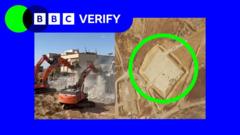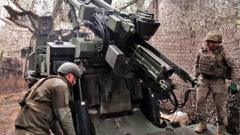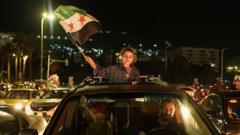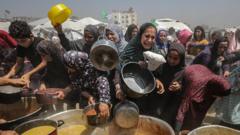**Recent drone attacks in Sudan are raising concerns over humanitarian fallout and regional stability as both sides escalate their military capabilities.**
**Evolving Drone Warfare Escalates Sudan's Civil Conflict**
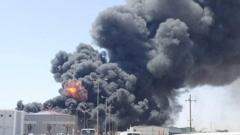
**Evolving Drone Warfare Escalates Sudan's Civil Conflict**
**Sudan's Rapid Support Forces unleash drone strikes, shifting the dynamics of civil war amid humanitarian crises.**
In an alarming development, drone strikes by Sudan’s Rapid Support Forces (RSF) have marked a critical escalation in the civil war, which has already inflicted severe humanitarian consequences. Following their retreat from Khartoum, these paramilitary units appear to be intensifying their military operations through sophisticated aerial assaults on Port Sudan, previously deemed a safe haven.
Recent weeks have seen RSF conducting a series of unprecedented drone strikes targeting vital infrastructure, causing extensive power outages and water shortages in Port Sudan. This strategic shift indicates a heightened commitment from the RSF to sustain military engagement despite suffering substantial territorial losses. Experts, including Alan Boswell from the International Crisis Group, highlight the RSF's enhanced capabilities in drone warfare, suggesting these developments significantly intensify the ongoing conflict.
Emerging as a major player in this war, drones have become critical to both the Sudanese Armed Forces (SAF) and the RSF, underpinning a power struggle that has drawn various local and international factions into its fold. As the conflict enters its third year, the UN has termed it the world's gravest humanitarian crisis, exacerbated by escalating drone warfare aimed at civilian infrastructure.
The RSF has notably focused on a shift in its military strategy to employ more remote warfare tactics, emphasizing their ability to impact targeted locations without physical presence. As the conflict progresses, analysts suggest that the RSF's drone capabilities could considerably alter the operational landscape.
Striking Port Sudan, which hosts government officials, diplomats, and humanitarian workers, reflects a deliberate strategy by the RSF to unsettle perceptions of safety. Political analyst Kholood Khair notes that the RSF seeks to reshape the narrative surrounding the SAF's control of Khartoum, emphasizing that the RSF remains a potent force capable of challenging the army's grip on power.
Technological advancements play a significant role in the warfare dynamics, with the RSF employing loitering drones to penetrate defenses while coordinating attacks on strategic military targets. Reports suggest these drones are possibly sourced from foreign entities, further complicating the international implications of the conflict. There are allegations of the United Arab Emirates (UAE) providing drones to the RSF, which both parties dispute, yet the evidence of foreign support is compelling.
As the RSF successfully pivots to drone-centric tactics, it symbolizes a broader transformation in conflict modalities, seen previously in other international conflicts. This reliance on drone warfare raises questions about the long-term prospects of conflict resolution. Justin Lynch, from Conflict Insights Group, emphasized that without robust diplomatic engagement, the conflict in Sudan could persist for years, if not decades. The ongoing military exchanges continue to highlight the necessity for international stakeholders to address the complexities rooted in arms supply and regional security dynamics.
The droning of civilian infrastructure and the war's strategic shifts call for enhanced global attention and humanitarian considerations, raising concerns that ordinary Sudanese citizens will continue to bear the brunt of this escalating violence.

